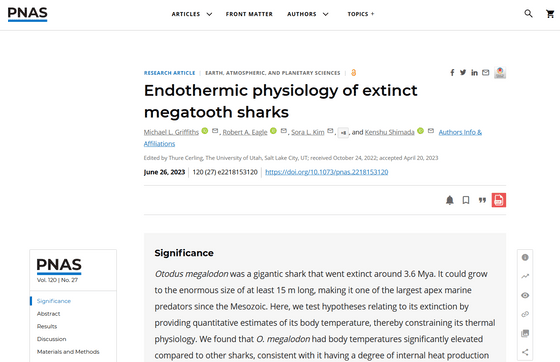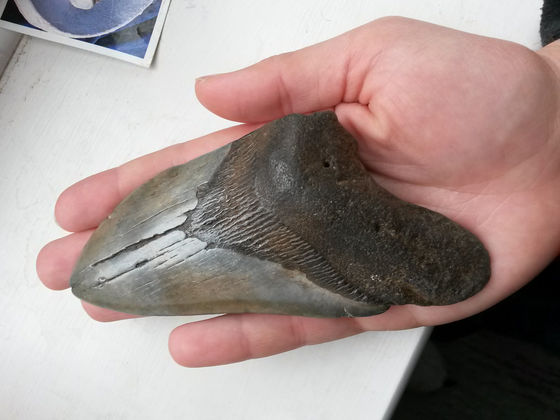It turns out that the largest shark ever `` Megalodon '' was a warm-blooded animal

by
Megalodon, one of the largest carnivores that ever lived on Earth, appeared 23 million years ago and dominated the Earth's oceans for nearly 20 million years before disappearing 3.6 million years ago. A shark, it is said to have reached a length of at least 15 meters and up to 20 meters. It turns out that the megalodon's body had warmer blood than the surrounding seawater.
Endothermic physiology of extinct megatooth sharks | PNAS
https://doi.org/10.1073/pnas.2218153120

Megalodon was a warm-blooded killer, but that may have doomed it to extinction | Live Science

In a study published in the Proceedings of the American Academy of Sciences on June 26, 2023, a research team led by Kenshu Shimada, a paleontologist at DePaul University in the United States, chemically determined the composition of the substances that make up megalodon teeth. I analyzed and conducted research to find out what kind of ecology Megalodon had.
Most studies of ancient creatures use fossils, but megalodon is a cartilaginous fish, so its bones are rarely fossilized. On the other hand, fossils of the giant teeth that give the megalodon its name are relatively common and offer a strong clue.

by
Regarding the content of his research, Shimada said, ``If you look at the isotopes of minerals that contain biologically mineralized hard tissues, like teeth, you can look at the temperature at which they were formed. 'Dinosaurs have long been used to estimate body temperature, but this new study shows that it can also be applied to marine vertebrates like sharks.'
As a result of the analysis, it was confirmed that the average body temperature of megalodon was 27 degrees, which is higher than the average body temperature of modern sharks of 22 degrees to 26.6 degrees. In this way, animals with high body temperature due to metabolic heat are called endotherms , and megalodon is said to have been a 'regional endothermy' in which part of the body was partially warm. increase.
The megalodon's high body temperature helped it gain the strength needed to become an apex predator, swimming fast and traveling long distances. According to Mr. Shimada, even today, warm-blooded sharks such as mako sharks and great white sharks can swim faster than cold-blooded sharks. A high metabolism is also believed to have helped facilitate the digestion of food.

But this strength was also a double-edged sword. Regarding the cause of megalodon's extinction, Shimada said, ``The time when megalodon disappeared from the fossil record coincided with a period when the Earth's climate cooled. However, it is quite possible that ecological changes due to cooling changed the habitats of the marine mammals that megalodon depended on for food. It caused a shortage and led to the end of Megalodon.'
Related Posts:







